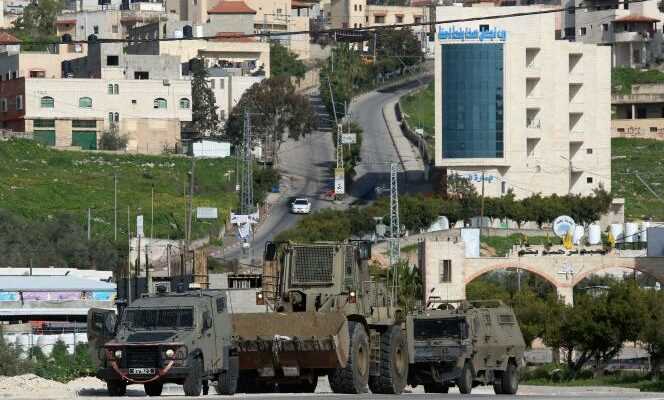The situation remains tense, Thursday, March 31, in Israel and in the Palestinian Territories in the wake of a deadly attack near Tel Aviv. Two Palestinians were killed in an Israeli army raid in the West Bank, while a knife attack on an Israeli bus left one seriously injured.
Early Thursday morning, Israeli forces carried out an operation in the Palestinian camp of Jenin, in the northern West Bank, after the attack which left five dead on Tuesday, including two Ukrainian workers and an Arab Israeli policeman, in the suburb of Tel -Aviv.
Two young Palestinians, aged 17 and 23, were killed “by the Israeli occupying forces who were carrying out an incursion into the area of Jenin”, denounced the Palestinian Ministry of Health. Other officials also reported serious injuries in these armed clashes.
The Israeli army confirmed that soldiers and members of the Border Police, a paramilitary unit, had “carried out an operation” in Jenin, in order to apprehend “suspects”. “During this operation, Palestinian gunmen opened fire on the troops, who retaliated by opening fire”the army said, adding that a soldier had been slightly injured and taken to hospital.
Increase in arrests
After the Tel Aviv attack, the Israeli army deployed reinforcements in the West Bank and multiplied the arrests, in particular of members of the family of the perpetrator of the attack, Dia Hamarshah, a Palestinian from Yaabad, a village neighboring Jenin, having spent four years in Israeli prisons.
For its part, the Islamic Jihad, the second Palestinian armed Islamist movement after Hamas and very present in the Jenin sector, asked its members to be on alert. “In the light of events in the camp (…) the secretary general of the Islamic Jihad announces a general mobilization of the Al-Quds Brigades [branche armée] in their localities”announced the armed Islamist movement led by Ziad Nakhalé, based in Damascus.
Later Thursday morning, on a bus traveling near Elazar, an Israeli settlement in the southern West Bank, a Palestinian man stabbed a passenger, seriously injuring him, before being shot dead by another armed passenger, according to the report. Israeli army.
Easing tensions as Ramadan approaches
In Jerusalem, far-right lawmaker Itamar Ben Gvir, known for his incendiary statements about the Palestinians, went Thursday morning to the esplanade of the Mosques, called Temple Mount by Jews, a few days before the start of the celebrations of Ramadan. “All night Hamas threatened me, saying I was in the line of fire, and told me not to come here. I say to the Hamas spokesperson: shut up”declared on the spot Mr. Ben Gvir at the head of the religious Zionism party.
In 2000, the controversial visit of the leader of the Israeli right Ariel Sharon on the esplanade served as a trigger for the second Intifada, a Palestinian uprising.
The esplanade of the Mosques, under the authority of Jordan but whose entry points have been controlled by Israel since the capture of East Jerusalem in 1967, was the scene last year during Ramadan, the month of Muslim fasting, clashes between the Israeli army and Palestinians. The clashes, which left hundreds injured, led to a deadly eleven-day war between the Islamists of Hamas, in power in Gaza, and the Israeli army.
Over the past few days, senior Israeli officials, including President Isaac Herzog and Defense Minister Benny Gantz, have traveled to Jordan for talks with King Abdullah II, who for his part has visited the leader of the Palestinian Authority, Mahmoud Abbas, in the hope of calming the situation in the run up to Ramadan, which begins at the end of the week.
